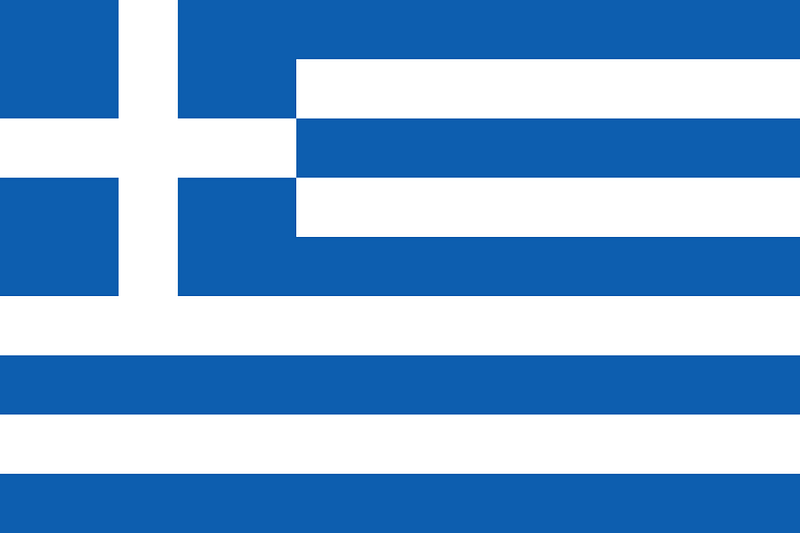This travel wiki page on Greece will help guide travelers with quick and relevant information to consider when planning and visiting the country. It is difficult to find all the relevant information you need on culture, safety, travel restrictions, and things to do, so we summarize it all here. If anything is stale or outdated, please let us know! Let’s dive in and explore more high-level information as a Greece trip planner.
Posted November 8, 2022 – Last updated June 23, 2024
Table of contents
National Information & Culture

Greece, officially the Hellenic Republic, is a country in Southeast Europe that shares land borders with Albania, North Macedonia, Bulgaria, and Turkey. It has thousands of islands and the longest coastline in the Mediterranean basin. The capital and largest city is Athens, followed by Thessaloniki and Patras. Greece is a member of the European Union, so the official currency is the Euro (€).
Greece is the cradle of Western civilization. It is also the birthplace of democracy, western literature and theater, philosophy, major scientific and mathematical principles, and the Olympic Games.
Greece’s culture dates back over a thousand years, with influences from the Roman Empire, Greek Eastern, Latin, and Frankish states, the British and Ottoman Empire, and the Venetian and Genoese Republic. In addition, the Greek Orthodox Church also helped shape modern Greek identity and traditions.
The 18 UNESCO World Heritage Sites in Greece reflect its rich historical legacy. In addition, Greece has more archaeological museums than any other country (dating back to ancient times).
Greeks are mostly named after religious saints. They celebrate the name days (feast days) in a particular year. For the Greeks, name days are equally important as birthdays.
Greeks are family-oriented and close-knit. Unlike other cultures, Greek children only leave their parent’s house when they get married and start their family unit.
In Greece, they wave with a closed palm. Waving with an open palm is considered an insult for Greeks.
Lunchtime in Greece is primarily from 2 to 3 in the afternoon and is the heaviest meal of the day. They usually have light dinners no earlier than 9 in the evening.
Visit the Official Tourism Portal of Greece for more tips, hints, and information when planning your trip. Similarly, tourists can download the Visit Greece app for quick travel information and planning.
Special Travel Considerations

Covid-19 Policy
Greece has already lifted all measures related to COVID-19. Hence, all travelers entering Greece are no longer required to present documents about COVID-19, regardless of their country of origin.
Travel Insurance
Some Schengen visa categories to Greece may require travel insurance during application. The health insurance should be at least €30,000 and cover emergency hospitalization and repatriation expenses, and it must be valid throughout the Schengen area. Travel insurance can protect you against the inconvenience of injury, medical emergencies, theft, and flight cancellations. In addition, it is comprehensive protection in case anything goes wrong with your trip.
Visa Information

Greece is a member of the European Union and a signatory to the Schengen Agreement. Hence, the Schengen visa policy applies to Greece. EU citizens only need an ID card to enter Greece for 90 days within 180 days. Nationals from 62 other countries outside the EU also enjoy visa exemption to Greece for a maximum stay of 3 months within six months. Citizens from countries without an exemption to Greece and the Schengen Area must apply for a corresponding visa to the nearest Greek Embassy or Consulate. Visit the Hellenic Republic Ministry of Foreign Affairs portal for the complete list of countries requiring and not requiring visas to Greece.
In addition, travelers must have a passport at least three months old beyond their planned departure date. However, it is strongly recommended that visitors have a valid six-month passport every time they travel to other countries.
ETIAS
The European Union introduced the European Travel Information and Authorisation (ETIAS) to boost security across the Schengen Zone. It will be a mandatory requirement for visitors from visa-exempt countries starting in the first half of 2025. ETIAS is a travel permit or a visa waiver program in which all visitors, regardless of age, traveling to the Schengen countries must apply individually at least 96 hours before departure. It will be a multiple-entry permit valid for three years or until the passport expires (whichever comes first) and can be used to visit all ETIAS member countries.
As of this writing, the European Travel Information and Authorisation System (ETIAS) is not in operation and does not accept applications for travel authorizations. However, applicants can apply via an official website or mobile app before ETIAS is operated. The date travelers can apply for ETIAS will be published on this website, Europa Home Affairs. Visitors can also find more information on the European Commission’s website.
Popular Attractions
Greece is a beautiful country with an ancient history, fantastic culture, and unique Greek cuisine. It is home to 18 UNESCO World Heritage Sites and many other archeological places of importance. Visitors can also look for information and purchase e-tickets to museums, cultural venues, nearby restaurants, and attractions and locate beaches from the Visit Greece app.
Athens Acropolis
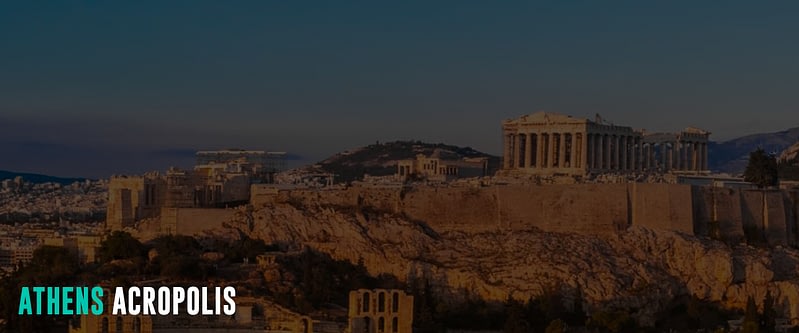
The Acropolis symbolizes Athens and Greece and is the most critical site in the ancient world. Three magnificent temples, dating back to the 5th century BC, crown the Acropolis. The most distinctive and famous is the Parthenon. People lived in the Acropolis from 4000-3000 BC until the late 6th century BC. But in 510 BC, the Delphic oracle declared the Acropolis the sole province of the gods. In 1987, the Acropolis became part of the UNESCO World Heritage List.
Parthenon
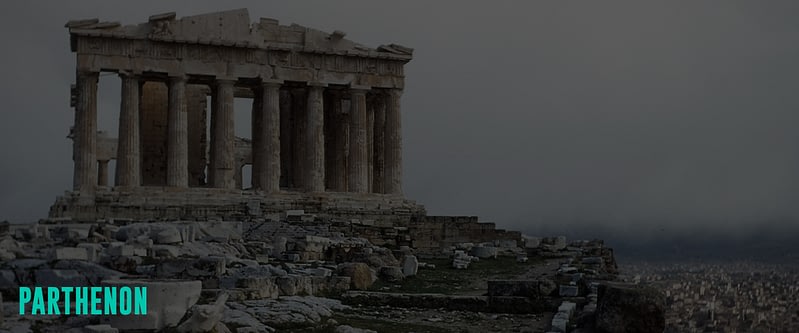
The Parthenon is the epitome of Ancient Greece’s glory. It is dedicated to Athena Parthenos, the goddess of battle strategy and wisdom, embodying the city’s power and prestige. The Parthenon, the largest Doric temple ever completed in Greece, took 15 years to build and was completed in 438 BC. It has 58 columns supporting a roof, ornate pediments, and a frieze. Standing sentinel over Athens, the Parthenon illuminates the city at night.
Erechtheion
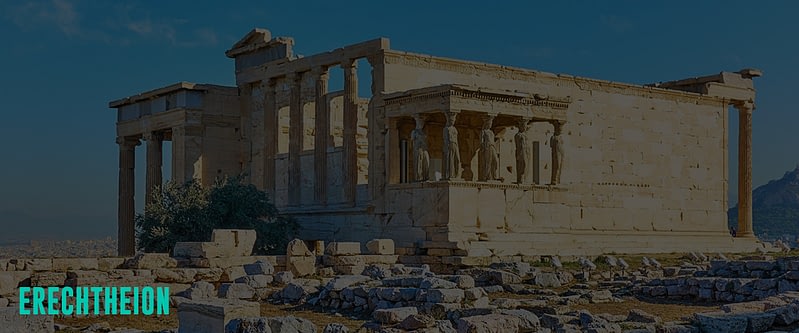
The Erechtheion is another sacred temple in honor of Greek Gods and Goddesses, including Athena, named after the mythical king Erectheus. Its iconic structure highlights the six Caryatids—female statues that serve as supporting columns to hold up the roof.
Temple of Athena, Nike, & Propylaea
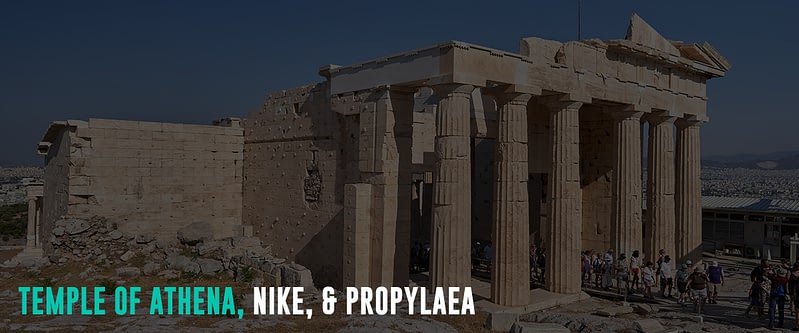
The Propylaea is what the visitors will see first when entering the Acropolis. It is the primary gateway into the sanctuary (as a dedication to Athena) and predominantly features six towering marble and limestone columns. Right next to the Propylaea is the Temple of Athena Nike. It is a classic site of worship dating back between 426-421 BC in honor of the city’s protector.
Odeon of Herodes Atticus
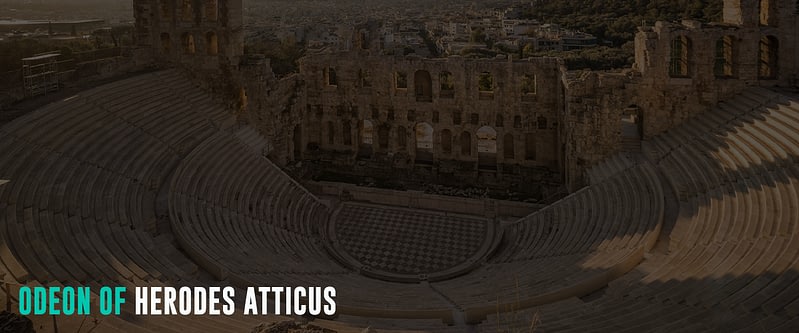
The Odeon of Herodes Atticus dates back to 161 AD and was built by Herodes Atticus in memory of his wife. This massive landmark is a theater that can accommodate roughly 5,000 visitors. Today, this theater still holds concerts and other events, including the Athens and Epidaurus Festival.
Acropolis Museum
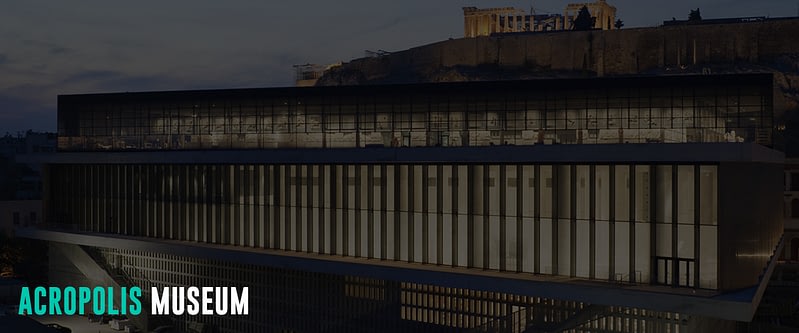
The Acropolis Museum is one of the top attractions in Athens and among the most important museums in the world. It houses the findings of only one archaeological site, the Athenian Acropolis. Among the ancient finds on display here are the 6th-century-BC Moschophoros (statue of a young man carrying a calf on his shoulders), the Caryatids (sculptures of female figures that hold up the Erechtheion), and the highly controversial Parthenon marbles.
Santorini

Santorini is a volcanic island in the Cyclades. It is famous for its ‘dramatic’ views, beautiful sunsets, and the white-washed houses of the cliff-top towns of Fira and Oia. The towns of Fira and Oia are romantic destinations popular for weddings and honeymoons.
Visitors can sunbathe and swim at the black volcanic sand beaches on the south and east coasts and visit the archaeological site of Akrotiri. It is an Ancient Minoan settlement buried below lava following the volcanic eruption that created the caldera 3,600 years ago. Other top activities in Santorini include volcanic island cruises, where visitors explore the volcanic islands and the Aegean Sea. Guests can also stop by the volcanic hot springs, perfect for an afternoon swim.
Mount Olympus

Mount Olympus, the famous home of the god Zeus, is the highest mountain in Greece. It is home to more than 1700 plant species (some rare and endemic), wolves, jackals, deer, and more than 100 bird species. Towering at 2,918 meters and halfway between Athens and Thessaloniki, this mountain is a top recreation destination in the summer. Mount Olympus National Park has three hiking trails, and reaching the summit gives mountaineers excellent views.
Mykonos
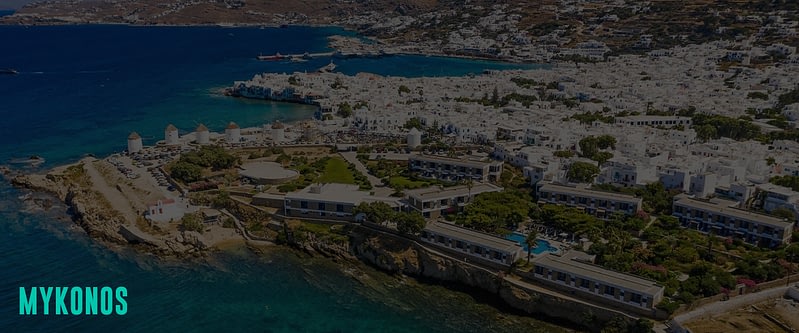
Mykonos is the most glamorous Greek island destination, popular with international celebrities. It is notable for its chic boutique hotels, classy seafood restaurants, and live music venues. Mykonos is a traditional Cycladic village. It has maze-like narrow and winding streets, where cars are not allowed in the heart of the town.
Mykonos makes a great home base for a short trip to the island of Delos.
Delos
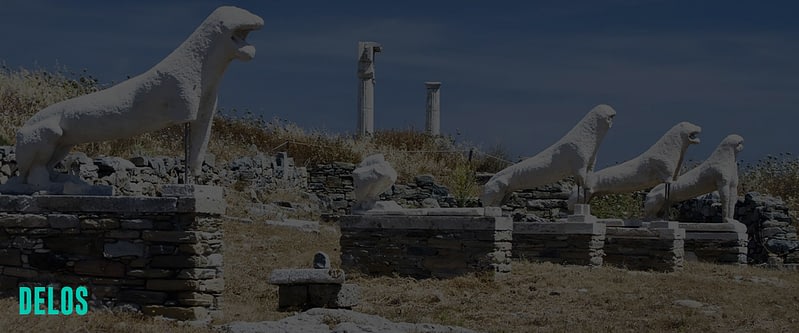
The ancient island of Delos is a must-see attraction in Greece. As one of Greece’s most important mythological, historical, and archaeological sites, it was on the UNESCO World Heritage List in 1990. Delos is near the center of the Cyclades group of islands and the mythical birthplace of twins Apollo and Artemis in Greek legend. This sacred island doesn’t have inhabitants, but daily ferries from Mykonos can take visitors to explore the ruins.
Top attractions in Delos include the Sanctuary of Apollo, Artemission (Temple of Artemis), the Terrace of the Lions, Sacred Lake (drained in 1925), Cleopatra’s House, and the House of Dionysius. This luxury private home dates back to the second century. Excavations are ongoing on the island, and many artifacts are displayed at the Archaeological Museum of Delos and the National Archaeological Museum of Athens. Findings suggest that the island has had inhabitants since 3000 BC.
Delphi
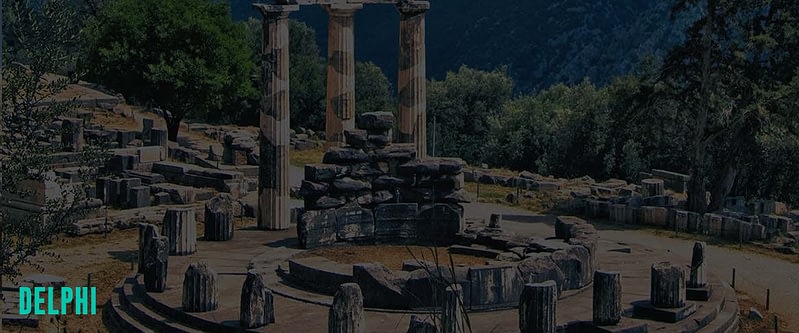
Delphi is one of the most historical sites in Greece. It was a sacred place in ancient Greek religion, home to the sanctuary and oracle of Apollo. Ancient Greeks came here on pilgrimages to worship Apollo (the god of light, prophecy, music, and healing) and ask advice from the mythical Oracle.
Delphi is a UNESCO World Heritage Site on the slopes of Mount Parnassus. It consists of the ruins of numerous temples, a theater, and a stadium dating from between 800 BC and 200 AD. The Delphi Archaeological Museum is nearby and displays an impressive collection of finds from the site.
The most prominent structure is the ancient theater of Delphi. Its location on a hill gives spectators a view of the sanctuary and the spectacular landscape below. The theater dates back to 400 BC and can seat 5,000 spectators. Today, Delphi Theater is one of the top tourist attractions in Greece.
Meteora Monasteries

The century-old Meteora Monasteries in Thessaly Plain are one of the most unusual things to see in Greece. These six monasteries look spectacular and bizarre on top of rock pillars and are now a UNESCO World Heritage Site. Visitors must climb several flights of stone steps carved into the rocks to reach each monastery. Inside, flickering candles, religious icons, Byzantine frescoes, and burning incense are displayed.
Visitors must spend at least one day in the area to see all six monasteries. The location is pleasant and relaxing, with small hotels and family-run restaurants serving traditional Greek cuisine.
Rhodes Island
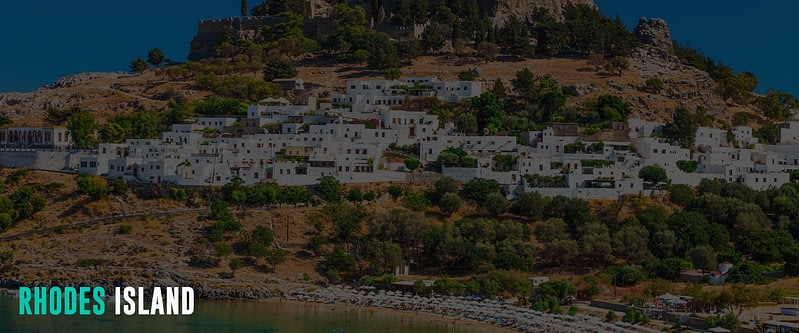
Rhodes is the largest of the Dodecanese islands in the Aegean Sea, close to Turkey. Its capital, UNESCO-listed Rhodes Town, is one of the top tourist destinations in Greece. An impressive fortification system, including monumental towers and gates dating back to the 14th century, encloses the town. Visitors will enjoy exploring the car-free cobbled streets of the old city on foot.
Nearby attractions include the pretty hillside coastal and medieval towns of Lindos and Marmaris on the Turkish coast. Above the town is the Acropolis of Lindos, offering spectacular views of the harbor and town.
Primary Spoken Language(s)
Greek is the official language of Greece and the oldest written language, dating back over 5,000 years. A large majority of people in the tourist industry speak English. In addition, English is part of the school curriculum. Therefore, most Greeks have a good command of English and a few other languages, such as French, German, Italian, etc.
Although Greek is a complex language to pick up, it still pays to learn a few common Greek words like ‘please’ (parakalo), ‘thank you’ (efharisto), and ‘hello’ (you). Then, visitors will get a favorable response as you try to communicate with the locals.
Safety Concerns

Greece remains among the safest countries in the world, with Level 1 Travel Advisory from the US Department of State as of July 26, 2023. Similarly, Greece ranks 60th out of 163 countries on the 2023 Global Peace Index.
The crime rate in Greece is low, especially on the islands. Visitors will not worry about walking late at night and chatting with the locals. On the islands, visitors can relax and enjoy a carefree atmosphere. But in Athens, travelers should be careful, as pick-pocketing is frequent in large queues, such as on buses or when boarding the ferry. So be watchful of your bags and belongings. Leave your expensive jewelry and valuables at home or in the safe as much as possible.
For emergencies, dial 100 for police assistance, 1571 for the tourist police, 166 for an ambulance, 1016 for doctors, and 199 for fire. Similarly, travelers can dial the European emergency number 112.
Natural Hazard
Tremors and earthquakes regularly occur in Greece due to its location on a network of geological faultlines. Hence, in the event of a natural disaster, follow the instructions of local authorities.
Smoking Regulations
Laws in Greece prohibit smoking in enclosed public spaces, transport stations (including taxis, ferries, etc.), workplaces, entertainment venues, bars, clubs, and cafés. However, many designated smoking areas are available.
Budget Considerations
Greece always leaves an expensive impression on travelers when they think of the picturesque white and blue homes on the cliffs in Santorini. It can indeed be true! But with careful planning and booking, it is still possible to enjoy Greece on a budget. Considerations include the travel season, destination city or island, accommodation type, food, and activities that tourists choose.
Accommodation

The cost of accommodation is where travelers usually spend most during a trip. In Greece, staying in a hostel ranges between $20-45, while a three-star hotel costs between $70 and $120, relative to location and travel season. Meanwhile, luxury accommodations go as high as $1000 per night on the islands of Santorini and Mykonos.
Foods
Food in Greece is pretty cheap compared to other European countries. A pastry and coffee breakfast in a local café starts at $6. Visitors can also grab a traditional Greek fast-food meal for $6. A hearty lunch in an Asian, American, or Mediterranean restaurant costs $11-15, while a seafood dinner costs $15-25.
Attractions and Transportation
Another thing that will take a significant portion of the travel cost is the kind of activities and tours every visitor avails of. Of course, visitors should not miss exploring the top attractions in the country. It includes the Acropolis, its adjacent museum, the ruins, and the contemporary architecture of Athens. Regular tickets cost $10, while a guided tour costs $40. A guided tour to Mount Olympus costs $55, including a visit to the ancient theater of Dion and a short trek to the Epineas Gorge of Mount Olympus. A five-hour cruise to Santorini’s caldera region costs around $150. Another must-see attraction in Greece is the ancient island of Delos in Mykonos. A day trip to Delos costs $178.
In addition to the optional paid tours and attractions, travelers can enjoy free activities and destinations. For example, they can visit free art galleries and museums, the Monolithos Castle, or have fun at Paradise Beach.
On the other hand, it is easy to explore Greece by using public transportation. Fares are affordable and as low as $1.50 for a single ticket for a 90-minute metro, bus, and tram ride. Travelers can also get a daily pass at $4 and $9 for a five-day pass. Ferry rides to the islands cost $20 from Piraeus (Athens) to Mykonos and $40 to Santorini on a standard ticket. Renting a car for as low as $20 daily is another excellent option in Greece. However, visitors also need to consider the hefty fuel and parking costs.
Average Two-Week Costs
Considering the above costs, a budget traveler can enjoy Greece for $70 daily or $980 within two weeks. The cost covers staying in hostel dorm beds, traveling by public transportation without missing the essential attractions, and trying some of the best Greek cuisines.
On the other hand, an average traveler will need $180 daily or $2520 for a two-week holiday in Greece. With this budget, a visitor can stay in a 3-star hotel, enjoy hearty meals and some drinks, and explore Greece on public transport and car rental. They can also avail of some paid tours and activities, including island hopping and cruising.
Lastly, luxury travelers can explore Greece for $400 daily or $5600 for two weeks. It can cover the cost of staying in a five-star hotel, dining anywhere, renting cars, taking high-speed rails, and all the paid tours and activities they want. So, for them, the sky is the limit for travel.
Please note that there will be days when travelers spend more and some days when they spend less. These are just the average minimum costs, and the ceiling can be unlimited.
Customs And Import Restrictions

According to European Regulations, in which Greece is a member state, all travelers entering or leaving the European Union with more than €10,000 or its equivalent in cash must declare the amount to Customs.
Customs and import restrictions at Greek points of entry distinguish between goods bought within the EU and outside the EU. When traveling to Greece from outside the EU, visitors are allowed to bring in the following for personal use:
- 200 cigarettes, 100 cigarillos, 50 cigars, or 250g of tobacco
- 2 liters of wine
- 1 liter of alcoholic beverage over 22% volume or 2 liters of fortified wine, sparkling wine, or other liquors
- 60ml of perfume
- 250ml of tap water
For further information, please visit the European Commission web page.
Climate Considerations

Greece enjoys a Mediterranean climate with sunshine, mild temperatures, and limited rainfall. However, the climate can vary significantly due to the country’s geographical position, topography, and distribution between the mainland and the sea.
Climatologically speaking, the year in Greece is divided into two seasons. The warm season is from April to mid-October, while winter is from mid-October to March.
During the warm season, the dry, hot days are cooled by seasonal winds called the Meltemi, while mountainous regions generally have lower temperatures. The northern islands have pleasant, sunny weather from April to June, with temperatures between 5°C – 29 °C. After that, it gets warmer in the south, with temperatures averaging 11°C to 31 °C. From July to August, summer temperature ranges from 15°C to 32 °C in the north and 21°C – 33 °C in the center-south. But it can still go as high as 40 °C at times. It starts to cool down again from September to October, with temperatures averaging between 8 and 27 °C in the north and 15 to 29 °C in the south.
Winter brings mild temperatures in lowland areas, with minimal snow and ice; mountains are usually snow-covered. Temperatures in northern Greece range between -3°C and 15 °C, while the south averages between 7°C and 20 °C.
Primary Transportation Options

Getting around Greece is relatively easy, with a good public transportation network. Visitors can explore Greece by plane, train, bus, taxi, car rental, and ferry.
Air
Traveling by plane is the best option for visitors who have less time to enjoy the beauty of Greece, although it is pretty expensive compared to buses and trains. There are numerous airports in Greece, both international (serving international and domestic flights) and national (catering only to domestic flights), including the outlying islands.
The biggest and busiest airport in Greece is the Athens International Airport. It receives most of the international traffic arrivals and foreign visitors and has connections to all the other national airports in the country. The second most significant international airport is Thessaloniki, which is popular with visitors who want to spend time in the northern part of Greece. Other famous international airports with big crowds during the summer include Heraklion, Santorini, and Mykonos.
Ferries
The most popular mode of transportation when traveling to the islands is by ferry. All islands are connected to at least one port on mainland Greece, and getting there by ferry is cheaper than flights. Also, many islands are connected by ferry, especially in the Cyclades. Hence, island hopping is a popular summer holiday plan.
There is also a regular ferry schedule between Greece and Italy all year round. Visitors who want to come with their car can connect these two countries by ferries from Trieste, Venice, Ancona, Bari, and Brindisi in Italy to Patra, Igoumenitsa, Corfu, and Kefalonia in Greece.
Buses
Buses are the most popular public transportation on the mainland, with KTEL buses having the largest fleet and the most connections between cities, towns, and villages. KTEL operates on almost all the big islands, even the distant destinations and slightly remote areas. They are a considerably reliable mode of transport, especially during summer.
Trains
Contrary to other European countries, Greece’s train network is somewhat outdated. Trains operate only in the northern part of the country, providing connections between Athens and Thessaloniki and covering routes in nearby cities and towns.
Visitors can choose an express or regular train ride, taking advantage of its affordable rates. Travelers can see and enjoy scenic areas by taking the train routes. Visitors will also see the 19th-century architecture of the old stations along the line, which has unique qualities and symbols of early industrial architecture.
Taxis
Taxis are also available in Greece, including the islands. However, taxis are not a good choice for long-distance travel as they can be expensive. They are only ideal for emergencies and on the islands when no buses are available.
Car Rentals
The best alternative for a flexible trip in Greece is renting a car. With special arrangements with the agency, visitors can use the vehicle to reach out-of-town destinations and explore as much as they want. In Greece, they drive on the right-hand side of the road, with the steering wheel on the left side of the car.
Start Trip Planning

Travel-Wise is made from the ground up to help people travel more, break down the barriers that make it challenging to get going, and start your journey as painlessly as possible. Bookmark our other Country Guides to help kick-start your research for future travels. We also offer templated itineraries from our staff and community that help serve as a building block for your trip plans. Alternatively, we also utilize AI to offer a way to generate itinerary ideas. This saves much time just getting you up and running with a template. From there, you can use the trip planner to create your customized itinerary, invite friends and family for collaboration, find others from Travel-Wise to join the trip, book and track important information, journal, and share your experiences at the end or along the way!

